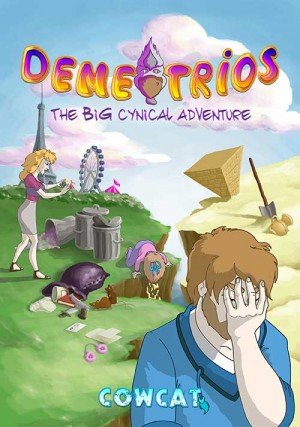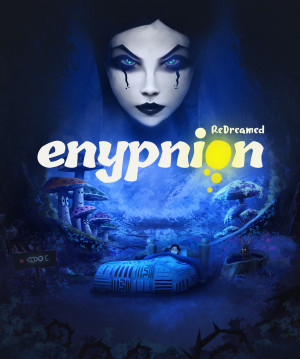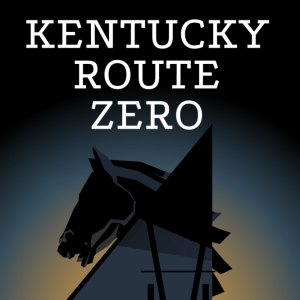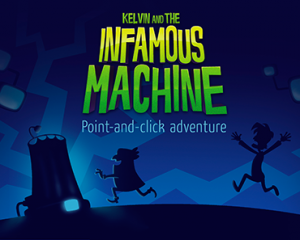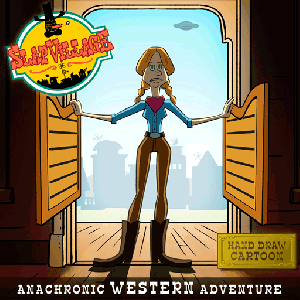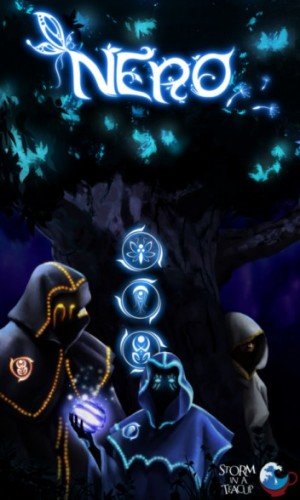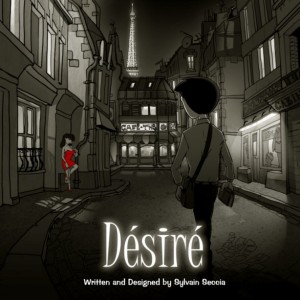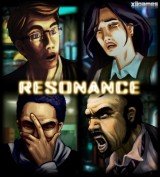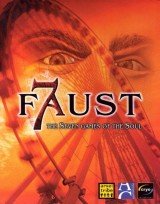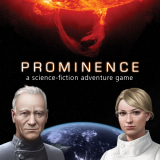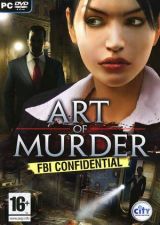Review for Demetrios: The BIG Cynical Adventure page 2
Ah, Paris. Mysterious artifacts, source of globe-trotting adventure, romantic bickering and... fart jokes? Move over George and Nico – Demetrios: The BIG Cynical Adventure is coming through, with a foul mouth and a serious case of Broken Sword envy. That's not to say the debut release from indie developer Cowcat is just lazy pastiche, though: underneath it all there's an unexpectedly well-constructed story. The characters may not be that likable, and the humour definitely won't be to everyone's taste, but there's ample meat to get your puzzling teeth into and twists and turns aplenty in this lengthy tale.
Bjorn Thonen is (despite the name) a Paris native and occasional antique dealer. "Occasional" both in the sense that business is slow and that his wares are rarely the antiques he claims they are. Bjorn is (let's be honest) a happy-go-lucky slacker who's perfectly content to snap up an ancient bird statue of unknown provenance for 20 euros, no questions asked. Even a strange phone call warning him of grave danger ahead doesn't faze him. At least, not until burglars break into his apartment, knock him out, and steal a tablet the bird was holding. (Not to mention his wallet, but there's rarely much in there other than moths.)
When the police don't bat an eyelash, despite the discovery that a similar tablet has just been stolen in Belgium, the usually shiftless Bjorn is spurred into action. Naturally, there's more going on here than a couple of simple robberies, and he soon finds himself drawn deeper into a plot revolving around Demetrios, ancient king of the tiny forgotten nation of Nogo. Along the way, he stumbles across alien artifacts, clones, and a temple that has been lost to the desert for centuries. He winds up impersonating a police officer, playing pinball on a tombstone, brewing potions and (briefly) moonlighting as a hired assassin, all in the name of saving the world. Or maybe it has more to do with the prospect of an unimaginably vast treasure hoard.
Tagging along through all of this are Bjorn's neighbour Sandra and her sarcastic eight-year-old daughter Caroline. Frequently frustrating but occasionally helpful, they take way too much on holiday, mislay crucial items at just the wrong moment, and cook the world's worst soup. Even if Bjorn would like to think romance is budding between them, Caroline is always there to put a spanner in the works, if Bjorn's own clumsiness and social ineptitude hasn't done that already. They're an odd couple, to be sure, but they're also too self-absorbed and cynical to do much more than get on each other's nerves.
Demetrios belies its "cynical" label by looking and sounding bright and sunny. For the most part the cartoon graphics are nicely-drawn, colourful and detailed. The work of a talented amateur rather than a professional, there are some rough spots – a little dodgy shading here, a crude-looking mountain in the background there – but overall the visuals are a great success. There are around 40 locations to explore, from Bjorn's apartment and shop to a funfair, a bazaar and even a graveyard.
Unusually for this art style, you explore in first-person rather than third. However, Bjorn's not hiding: every comment he makes is accompanied by his expressive portrait popping up. After a while, I grew to appreciate this approach more and more; without the need to walk from place to place, interactions moved along at a brisk clip. This is especially helpful as every screen is absolutely packed with things to look at. Pretty much everything you can see merits a remark, and often more than one. Each of the books on Bjorn's bookshelf gets its own sidenote, for example. It's a great way for him to convey his personality, and being able to hop from item to item instantly made me much more inclined to hang around and investigate them all.
Cutscenes are handled in a comic book style, each page revealed panel by panel to the accompaniment of appropriate sound effects. Along with helping to cement the less-than-serious tone, this technique feels like a pragmatic but stylish way to handle storytelling on a budget.
The music likewise provides a jaunty background to events, with a selection of loosely themed scores for each area. There's a bit more accordion and cafe band in Paris, a little Arabian flavour in Nogo, and tense scenes get a more stripped-back, cautious feel. The relatively small repertoire of tunes gets a little repetitive at times, but fortunately they are so bouncy and good-natured it is easy to forgive.
There's no voice acting, the dialogue instead spooling into speech bubbles with a teletype-like clacking. As with the first-person view, this turned out to have definite upsides. For one thing, it further quickens the pace (reading being faster than speaking), and it also enabled a rather significant reworking of the script that we'll get to in a moment. (It must also have made translation easier; the text is also available in French, German, Spanish, Italian and Russian.)
This is as good a time as any to talk about Demetrios’s most controversial aspect: the toilet humour. It's full to overflowing with it, at least by default. Though it only occasionally peeks through into the main plot line, Bjorn's observations are peppered with jokes about bodily functions, sex and all things crude and disgusting. For some, this will undoubtedly be hilarious – in a very South Park kind of way – but it wasn't to my taste. Fortunately, a recent update has added the option to reduce or eliminate it from the game. Given how much of it there is, that must have been a pretty sizable undertaking, but after playing through with the option enabled, it does make a big difference. The crude observations are gone, sometimes replaced by more innocuous remarks and sometimes just cut out entirely. Not just that, but some objects have been replaced or renamed, and Bjorn is even more polite towards Sandra and Caroline at times. He's also just a bit tidier: rather than leave a knocked-over garbage bag to fester, for example, he's now willing to clean it up.
With all these changes, the update honestly makes it feel like quite a different game. Bjorn's still lazy, venal and a bit silly, but in a way much closer to adventure norms. (Think about it: with all the kleptomania and rough improvising they're called on to do, not to mention having to mess up at crucial moments for plot reasons, few genre heroes are particularly heroic.) That's not to say he's suddenly become likable and charming – I doubt he and I are ever going to be exchanging Christmas cards – but he was much easier to relate to. And without the distraction of all the crudity, I was better able to appreciate the underlying story driving things along.
The controls couldn't really be simpler: left-click to interact, click-and-drag to use a collected object. Your inventory runs across the bottom of the screen, toggled by a button in the lower left corner. A similar button in the upper left calls up a bar of additional options across the top of the screen: menu, load/save game, a row of "special" objects, and your current overall objective. The last one can be switched off in the options, presumably to give you a little more challenge. In practice, though, your goals are always pretty clear, and for me it was more useful as a reminder of where I was when coming back after a break.
The special objects are things like your mobile phone, shopping lists and recipes, which have their own unique functions (mostly tracking your progress in one of the fetch quests). This is actually quite a neat and flexible system, as it allows the game to add extra abilities as needed and saves you digging through your inventory to remind yourself what ingredients you're looking for. Your phone, for example, appears here when you find it, and disappears again when it becomes useless later on (it being tricky to get a signal in the middle of the desert). Providing its own storage area is convenient and easy to handle, without having to reserve a permanent spot in the interface for an item that's only available part of the time.
Also nestled among these objects are cookies, Demetrios's hint currency. Each location has three (often cunningly hidden) cookies for you to find, which you can later eat to stimulate your brain and come up with new ideas. Finding all the cookies takes patience and a sharp eye, but you're almost certain to stumble across at least a few. The hints you get aren't exactly subtle, generally spelling out the next step you need to take, so you should probably save them for when you're totally stuck. At times, they're also a little optimistic about how much you've worked out for yourself; I occasionally got a hint for the step after the one I was stuck on. Regardless, I appreciated the fact that the game makes you work at least a little for your answers and encourages you to think just that bit harder before giving in and declaring yourself stumped.
The puzzles are mostly a mix of standard inventory-based fare and minigames, with a few more abstract teasers thrown in for good measure. In fact, Demetrios is positively obsessed with minigames, at one point sending you to a funfair with half a dozen of them to play. These include fishing, horse (and worm!) racing and a claw crane, among others. They shouldn't prove much of a challenge even for adventurer-grade reflexes, though, and I found them to be a nice change of pace. Checking off every possible achievement takes a tad more skill, and you need some patience (particularly with the fishing and claw games, which are all too lifelike in the way your prey often slips off the hook), but doing enough just to proceed is thankfully straightforward.
The rest of the puzzles are pretty fair and logical; when I got stuck it was because I'd missed something or someone, not because of a left-field solution. That is, until near the end when a treasure map had me tearing my hair out. It seemed simple enough: use clues to find the right spot to dig. The only problem is that the clues were (to my eyes, at least) misleading and full of red herrings and there were a lot of possible dig sites. On top of that, the hint system suddenly decided to get all coy and vague, only telling me the few scraps of information I had figured out. And every time I guessed wrong, I died.
That's not so surprising, as death is a pretty frequent occurrence. The achievements even encourage you to find all the different ways to expire, and there's a snarky game-over screen to go with each. Not to mention all the ways you can get jailed or even abducted by aliens. It's all pretty painless, as you're always put straight back to a point just before you took the fatal action. But in that one instance, dying over and over until I stumbled on the right dig spot was the opposite of fun. However, like the goat puzzle in the first Broken Sword, it was the one blemish on an otherwise enjoyable puzzling experience. And given that there are 8-10 hours of playtime here, that's a pretty impressive achievement.
Tying everything together is a story that tries to be daft but actually fits together quite well, like the developer was trying be silly and funny but in the end couldn't help but shape it into a solid narrative. Sure, the setup is down to an ancient king who did stuff because he got bored, Bjorn's enemies aren't above messing with him for larks, and there's more than a whiff of sci-fi B-movie thrown in, but it works. You're drawn in step by weirdly logical step, and everyone's motivations make sense. If I have a criticism, it's that there's a lot of double-crossing going on, and people not being who they seem to be, and it all gets tied up in a rush in the finale. I was left blinking and trying to piece it all together and wishing it had been spread out more. Other than that, though, it winds up being a fine tribute to its inspiration.
All things considered, there's a lot to like about Demetrios. Underneath the crass dialogue there's a surprisingly coherent story, even if it does cross the finish line at a gallop. It's also a meaty, varied experience, enlivened by attractive cartoon graphics and perky music. Ultimately, though, this is a game that stands or falls by its comedy. To lovers of toilet humour it comes heartily recommended, while others may wish to tread more cautiously. Even with the humour dialled back, it's still a "big cynical adventure" for a reason. That said, so long as you're happy to have a bunch of less-than-lovable losers for travelling companions and you like your laughs on the snarky side, it's a journey well worth taking.
WHERE CAN I DOWNLOAD Demetrios: The BIG Cynical Adventure
Demetrios: The BIG Cynical Adventure is available at:
- GOG -88%
- Itch.io -33%
- HumbleBundle
- Amazon


